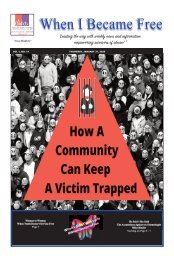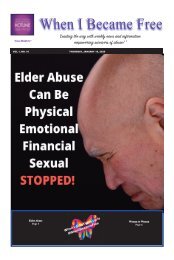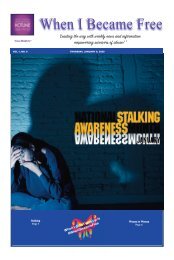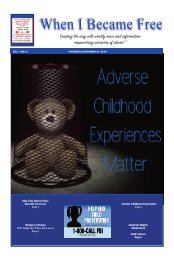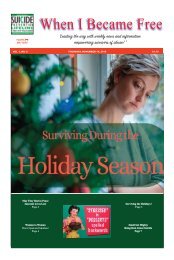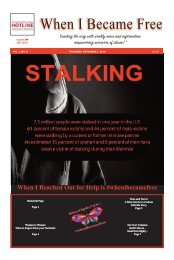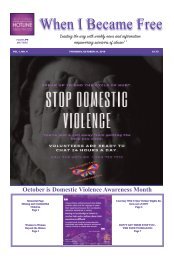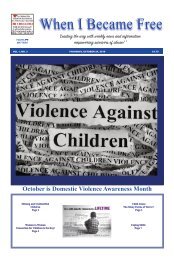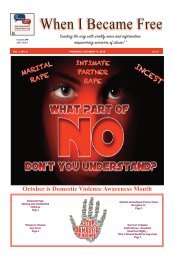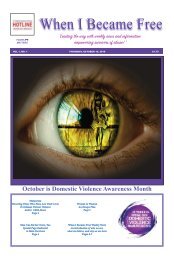Jan 23, 2020 When I Became Free
In this week's issue we focus on the topic of child sexual assault and what you can do to prevent it. Please share
In this week's issue we focus on the topic of child sexual assault and what you can do to prevent it. Please share
- No tags were found...
You also want an ePaper? Increase the reach of your titles
YUMPU automatically turns print PDFs into web optimized ePapers that Google loves.
<strong>Jan</strong>uary <strong>23</strong>, <strong>2020</strong> WHEN I BECAME FREE Page 5<br />
CONTINUED FROM PREVIOUS PAGE<br />
The words I shared with you on the previous page are the words I wrote along my healing<br />
journey and have been published to my blog, Thankfully Chewed Up and Spat Back<br />
Out. They convey snippets of my past, when I was a victim. A young child trying to attempt<br />
to make sense out of world that was confusing and scary.<br />
Buried in those words are the signs that I was a child who had experienced sexual assault.<br />
Signs that my loved ones, my parents and other adults around me missed. They<br />
missed those signs because, in my case, this all took place in a generation where we buried<br />
our heads - society was not working to bring awareness to issues of trauma and abuse.<br />
Children were to be seen, not heard.<br />
I am thankful that in today’s society people like me are now able to share our experiences<br />
to a wide audience in an attempt to bring awareness so that no other child ever has<br />
to know nor carry the pain of child abuse and child sexual assault.<br />
Let’s take a look at the signs buried within my words - I went from a happy carefree<br />
child to being careful not to bring attention to myself, I withdrew. I became hypersensitive<br />
to my surroundings. I had nightmares and I attempted suicide at an age so young<br />
where I should have only known to how live.<br />
There are others aspects of my childhood I haven’t shared here but they would have<br />
shown that I was an ill child, always getting sick. Low self esteem started taking over my<br />
emotions and my thoughts.<br />
Granted, all of these signs could have painted the picture of something else, but in the<br />
end, they all showed that I was a child who needed attention beyond a passing glance.<br />
<strong>When</strong> I finally told my mother what had happened to me, she recoiled and placed more<br />
worries and shame on my shoulders. I was only 14-years old and already wishing I could<br />
disappear. After that days she never brought the topic up again - I would be an adult before<br />
I revisited it with her.<br />
Now as a parent I cannot imagine what it would be like to hear such horrors from my<br />
child and thankfully, I never have had to absorb such a nightmare. For the parents who do,<br />
I want you to know your reaction to your child’s truth can make or break when and how<br />
their healing journey will begin. That is a heavy responsibility, however, at the same time<br />
if you take a deep breath and reach out for the right help, you will be providing a safety<br />
net for the life you created. There is help. It will not erase the harm but it will save unneeded<br />
additional trauma.<br />
To set the stage for your child to feel comfortable coming to you it should begin as early<br />
as possible. The following comes from the advocacy group RAIIN:<br />
Be involved in the child’s life.<br />
Being actively involved in a child’s life can make warning signs of child sexual abuse<br />
more obvious and help the child feel more comfortable coming to you if something isn’t<br />
right. If you see or hear something that causes concern, you can take action to protect your<br />
child.<br />
Show interest in their day-to-day lives. Ask them what they did during the day and who<br />
they did it with. Who did they sit with at lunchtime? What games did they play after<br />
school? Did they enjoy themselves?<br />
Get to know the people in your child’s life. Know who your child is spending time with,<br />
including other children and adults. Ask your child about the kids they go to school with,<br />
the parents of their friends, and other people they may encounter, such as teammates or<br />
coaches. Talk about these people openly and ask questions so that your child can feel comfortable<br />
doing the same.<br />
Choose caregivers carefully. Whether it’s a babysitter, a new school, or an afterschool<br />
activity, be diligent about screening caregivers for your child.<br />
Talk about the media. Incidents of sexual violence are frequently covered by the news<br />
and portrayed in television shows. Ask your child questions about this coverage to start a<br />
conversation. Questions like, “Have you ever heard of this happening before?” or “What<br />
would you do if you were in this situation?” can signal to your child that these are important<br />
issues that they can talk about with you. Learn more about talking to your kids<br />
about sexual assault.<br />
Know the warning signs. Become familiar with the warning signs of child sexual<br />
abuse, and notice any changes with your child, no matter how small. Whether it’s happening<br />
to your child or a child you know, you have the potential to make a big difference<br />
in that person’s life by stepping in.<br />
Encourage children to speak up.<br />
<strong>When</strong> someone knows that their voice will be heard and taken seriously, it gives them<br />
the courage to speak up when something isn’t right. You can start having these conversations<br />
with your children as soon as they begin using words to talk about feelings or emotions.<br />
Don’t worry if you haven't started conversations around these topics with your<br />
child—it is never too late.<br />
Teach your child about boundaries. Let your child know that no one has the right to<br />
touch them or make them feel uncomfortable — this includes hugs from grandparents or<br />
even tickling from mom or dad. It is important to let your child know that their body is their<br />
own. Just as importantly, remind your child that they do not have the right to touch someone<br />
else if that person does not want to be touched.<br />
Teach your child how to talk about their bodies. From an early age, teach your child<br />
the names of their body parts. Teaching a child these words gives them the ability to come<br />
to you when something is wrong. Learn more about talking to children about sexual assault.<br />
Be available. Set time aside to spend with your child where they have your undivided<br />
attention. Let your child know that they can come to you if they have questions or if someone<br />
is talking to them in a way that makes them feel uncomfortable. If they do come to<br />
you with questions or concerns, follow through on your word and make the time to talk.<br />
Let them know they won’t get in trouble. Many perpetrators use secret-keeping or<br />
threats as a way of keeping children quiet about abuse. Remind your child frequently that<br />
they will not get in trouble for talking to you, no matter what they need to say. <strong>When</strong> they<br />
do come to you, follow through on this promise and avoid punishing them for speaking<br />
up.<br />
Give them the chance to raise new topics. Sometimes asking direct questions like, “Did<br />
you have fun?” and “Was it a good time?” won’t give you the answers you need. Give your<br />
child a chance to bring up their own concerns or ideas by asking open-ended questions like<br />
“Is there anything else you wanted to talk about?”<br />
As for evaluating caregivers, be diligent. It’s not always easy to trust another person<br />
to look after a loved one. Elder and child abuse is far too common, and choosing a caregiver<br />
can seem a little overwhelming. There are steps you can take to evaluate caregivers,<br />
such as babysitters or nursing homes, to reduce the risk of something happening to your<br />
loved one.<br />
Individual caregivers<br />
There are many situations in which you might want to leave a loved one in the care of<br />
an individual person such as a nanny, tutor, or senior in-home caregiver. Consider the following<br />
tips to choose someone who will care for your loved one safely.<br />
Contact multiple references that can vouch for the caregiver. Ask questions about their<br />
character, past performance, and interactions with their charges as well as other peers or<br />
colleagues.<br />
Are they willing to submit to a background check? If they say no, it’s worth reconsidering<br />
their services. Due to the low rates of reporting and prosecution of sexual violence,<br />
background checks are not 100 percent effective, but they can be a valuable tool in screening<br />
caregivers.<br />
Run a search on the National Sex Offender Public Website (NSOPW), a national resource<br />
that pulls data from state, territory, and tribal sex offender registries. You can search<br />
by name and region. You can perform your own cursory background check by researching<br />
public records–including legal records–and anything the person might have posted<br />
publicly online and via social media.<br />
Drop in unexpectedly. Visit your loved one from time to time without announcing your<br />
visit in advanced. This will give you a realistic sense for the standard of care the caregiver<br />
is providing..<br />
Centers, agencies, and organizations<br />
You might be considering a daycare center, an assisted living center, or a similar organization<br />
to provide care for your loved one. Take into consideration the following tips<br />
when determining who may provide the best care.<br />
Is the service provider licensed in the local jurisdiction? Most cities, counties, and/or<br />
states have regulations regarding qualifications for service providers that care for children<br />
or the elderly. Check with your local city or county to find a list of all certified care<br />
providers and ensure the service provider you are considering is on that list.<br />
What vetting and training is involved in the staff hiring process? Depending on the organization<br />
and type of service offered, employees may have to earn a certain degree, uphold<br />
certain certifications, or undergo training. Ask about these requirements and compare<br />
them across different organizations and against any county or state regulations that may<br />
apply. Ask about ongoing training for staff. What training is involved for noticing and responding<br />
to signs of abuse? How often is this information tested or reviewed?<br />
What is the management system like? How does the organization oversee staff and monitor<br />
its employees? Find out more about how caregivers are monitored or evaluated. How<br />
often does this happen? What is the policy for poor performance or failure to follow rules?<br />
Ask about turnover rates for caregivers. A high turnover rate could indicate signs of<br />
poor management and make for a less stable environment. Ask about the caregiver-tocharge<br />
ratio, or how many people the caregiver will be supervising. Does it seem like the<br />
caregiver will be able to provide adequate attention to your loved one?<br />
What is your general impression of the facilities? Are the facilities well-kept and clean?<br />
Are proper safety measures in place such as windows on classroom doors? Is there a<br />
security process in place to ensure only approved staff have contact with children/adults<br />
and all children/adults are accounted for at all times?<br />
To speak with someone who is trained to help, call the National Sexual Assault Hotline<br />
at 800.656.HOPE (4673) or chat online at online.rainn.org.<br />
If your child has been sexually assaulted<br />
If you find out or suspect that your child has been sexually abused by a family member,<br />
it can take a toll on you as a parent. It’s important to find a way to manage your feelings,<br />
so you can focus on creating a safe environment for your child that is free from harm,<br />
judgment, and blame. It is imperative that when your child discloses to you, you continue<br />
to repeat the following messages through both your words and your actions:<br />
I love you.<br />
What happened is not your fault.<br />
I will do everything I can to keep you safe.<br />
How am I supposed to react?<br />
There is no “right” reaction to hearing that your child has been abused. You may experience<br />
a wide range of reactions and feelings that may impact different aspects of your life.<br />
Some common reactions from parents include:<br />
—Anger. You may feel angry at the abuser for hurting your child or even frustrated with<br />
your child for not telling you. It’s also possible to feel angry at your child for disclosing<br />
the abuse. It’s not easy news to hear, but it’s important to remember it is not your child’s<br />
fault.<br />
—Anxiety. You might be anxious about responding in the “right” way to your child or<br />
navigating the other relationships in your life, especially if you have a relationship with<br />
the abuser.<br />
—Fear. Depending on your family circumstances, you may be afraid that the abuser will<br />
find a way to harm your child again or be concerned about taking care of your family on<br />
your own.<br />
—Sadness. You may feel sad for your child, for your family, or for yourself. <strong>When</strong> a child<br />
discloses sexual abuse, it will cause changes in your life. It’s OK to be upset over the<br />
changes in your life that may result from this disclosure.<br />
—Shock. If you had no idea that the harm was occurring, you may be very surprised to<br />
hear what has happened.<br />
It is important to keep in mind that there is no one “right” reaction, and that all reactions<br />
and responses are normal. Having both you and your child talk to a professional about<br />
these thoughts and feelings can help sort through these issues. Professional support can<br />
also result in healthier long- and short-term results for both you and your child.<br />
How do I manage these feelings?<br />
Your child is counting on you for support. In order to put your child’s safety first, it’s<br />
important to take care of yourself. That means finding a way to work through your feelings<br />
and reactions to the abuse that doesn’t interfere with your child’s welfare. It may not<br />
be easy, but with the right support it is possible.<br />
Consider talking to a counselor one-on-one. Individual counseling gives you the chance<br />
to focus entirely on you and your concerns, without needing to worry about how your<br />
child will react to those thoughts.<br />
Develop your support system. It might be family and friends you trust, or it might be<br />
a support group that you didn’t have a connection with before.<br />
Set limits. Dealing with these emotions can be time- consuming and draining. Set aside<br />
time for activities that don’t revolve around the abuse. Practice self-care to keep your mind<br />
and body in healthy shape.<br />
What if the perpetrator is part of my family?<br />
Finding out that your child was hurt by someone you know and trust can present some additional<br />
challenges as a parent. You may be faced with a range of emotions specific to this<br />
situation that others can’t relate to. No one has the right to invalidate the way you feel, but<br />
it’s important to find a way to manage these emotions in order to prioritize the safety of<br />
your child. Some experiences of non-offending parents may include:<br />
—Anger towards the child for disrupting your family, especially if the perpetrator is your<br />
partner<br />
—Anger towards the perpetrator for hurting your child and betraying your trust<br />
—Guilt that you didn’t know the abuse was occurring or for still having feelings for the<br />
person who hurt your child<br />
If it the person who harmed your child was another one of your children, you may feel conflicted<br />
about how to provide support to the child who was harmed while still trying to protect<br />
your other child.<br />
Losing faith in your judgement or abilities as a parent<br />
Practical fears about finances and day-to-day life that may change when the family member<br />
who caused harm is removed from the family circle.<br />
Continued on Next Page




